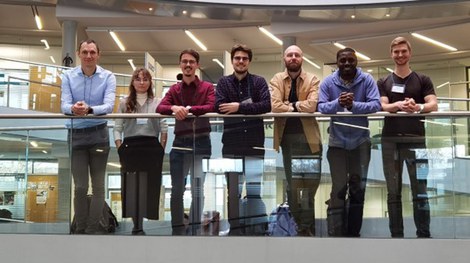Computational Cancer Genomics and Tumour Evolution
Within this line of research, the Anatomy and Embryology Research Group uses computational approaches to study human carcinogenesis.
The CCGG lab focuses on different phases of tumor evolution, mainly by studying somatic mutation patterns in normal tissues, primary tumors and tumor metastases. Somatic mutations are small DNA errors that accumulate during lifetime, eventually resulting in the formation of a malignant tumor. Studying their patterns has the potential to identify new cancer genes, indicate specific cancer vulnerabilities, or unveil fundamental processes that occur during tumor evolution like tumor-immune interactions, the development of treatment resistance or metastatic behavior.
The lab also has a special interest in ALK signaling in neuroblastoma and other tumors where ALK alterations have been described as genomic driving events. The aim of this research is to identify new therapeutic targets in these cancers.
Research projects
Tumor evolution and immune selection
We are using computational approaches to study neoantigens and immune selection signals in large, publicly available genomic and transcriptomic datasets and evaluate those signals as putative biomarkers for immunotherapy responses.
- researchers: Jimmy Van den Eynden, Arne Claeys
- funding: Bijzonder onderzoeksfonds (BOF; Special Research Fund, Ghent University), Kom op Tegen Kanker (Stand up against Cancer)
Mutant clones in normal tissues
Recent evidence suggests that somatic mutations lead to micro-clone formation in multiple histologically normal epithelial tissues, providing new insights in early human carcinogenesis.
We aim to characterize the normal tissue somatic mutational landscape of the human body using post-mortem tissues obtained from clinically well-annotated whole-body donors, using different DNA and RNA sequencing approaches.
- researchers: Jimmy Van den Eynden, Tom Luijts, Sofie Hoogstoel
- funding: CRIG partnership grant, Fonds Wetenschappelijk Onderzoek – Vlaanderen (FWO; Research Foundation – Flanders), Kom op Tegen Kanker (Stand up against Cancer)
Neuroblastoma and ALK signalling
ALK (anaplastic lymphoma kinase) is a protein that drives subgroups of neuroblastoma and other cancers. This multidisciplinary and international project aims to identify new therapeutic targets in cancers where ALK genomic alterations have been described as genomic driving events.
- researchers: Jimmy Van den Eynden, Jonatan Gabre, Joachim Siaw, Peter Merseburger
- funding: Barncancer Fonden, Fonds Wetenschappelijk Onderzoek – Vlaanderen (FWO; Research Foundation – Flanders), Stichting Tegen Kanker (Foundation against cancer), CRIG young investigator proof of concept (YIPOC) grant,
Collaborations
- Neuroblastoma: Frank Speleman and Kaat Durinck
- ALK signaling: Bengt Hallberg and Ruth Palmer (University of Gothenburg, Sweden)
- Mutant clones in normal tissues: Wouter Willaert, Anne Vral, Isabelle Hoorens and Tim Lammens
- Data integration and biological networks in cancer: Kathleen Marchal
- UV mutagenesis: Erik Larsson (University of Gothenburg, Sweden)
- Peritoneal carcinomatosis: Wim Ceelen and Wouter Willaert
Publications
Questions?
- Jimmy Van den Eynden, researcher
+32 9 332 48 55
